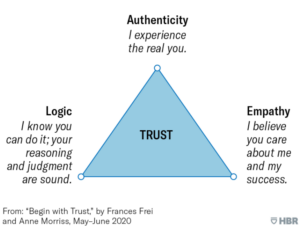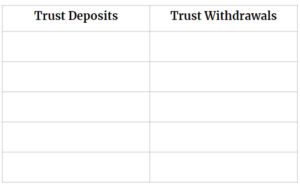Leading with Trust
“A team is not a group of people who work together. A team is a group of people who trust each other. ” – Simon Sinek
As a leader or peer, how and where do you begin with trust?
As an individual, on a team, or throughout an organization?
“They will freely respond only to individuals who are chosen leaders because they are proven and trusted as servants.” – Robert Greenleaf
What is trust: Building trust as a servant leader?
Our Community of Practice attendees came up with the following definitions for trust:
- Honesty / Truth / Integrity
- A safe space
- Meets expectations
- Reliability & authenticity
- Genuine faith in another person
It’s safe to say that the definition of TRUST depends on the situation and the individual. Our own experiences can influence our definition of the word.
Instead of asking what leaders should do…what do followers want?
- Trust
- Compassion
- Stability
- Hope
“Trust is primarily built through relationships, and it’s important because it’s the foundational currency that a leader has with [their] team or [their] followers.” – Tom Rath
Source: Gallup – Strengths-based Leadership
Our level of trust comes from our own definition of trust.
The basis of leadership is trust
The Harvard Business Review’s article, Begin with Trust, introduces three elements of trust.

Authenticity
- People behave in a way that their words and actions are congruent; they meet deadlines; behave in a way that is consistent with agreed values.
Empathy
- People behave in a way that others feel their needs and wants are understood.
Logic
- People behave in a way that engenders confidence in skills and decision making.
Another Harvard Business Review article, The 3 Elements of Trust, these three elements are taken one step further:
- People can feel they experience authenticity when you are consistent, when you walk the talk, and when you do what you say you will do when you say you will do it.
- You can improve the perception of your empathy by building positive relationships.
- You can demonstrate your logic with consistent good judgment and expertise and by being transparent about what underlies your decisions.
Trust is highest when all three elements are present.
How much do you have in your trust bank?
 We each have imaginary balances we informally keep in our trust bank with family, friends, associates, coworkers, and anyone else we interact with. These trust banks have deposits and withdrawals just like a regular bank account. Positive interactions are deposits and negative interactions are withdrawals.
We each have imaginary balances we informally keep in our trust bank with family, friends, associates, coworkers, and anyone else we interact with. These trust banks have deposits and withdrawals just like a regular bank account. Positive interactions are deposits and negative interactions are withdrawals.
What is my level of trust in others?
Use the Trust Bank Exercise below:
- List 3 different people in different aspects of your personal and professional life.
- On a percentage scale: 0% – 100%, how much do you trust each of these people?
- Why did you give this rating?
Follow-up with the Trust Bank Self-Audit:
- I trust others when _______ (fill in the blank).
- For each of the relationships named, what is my real intent (in these relationships)? Is it truly to serve them, or is it to serve myself?
- What if the roles were reversed? How much would they say they trust me? How do I know?
In The Speed of Trust by Stephen M. R. Covey, he shares you can improve trust deposits in your trust bank (organization or relationship) – by focusing on the 4 cores of credibility: integrity, intent, capabilities and results.
What things get in the way of building trust (withdrawals) and what adds (deposits) to you trusting someone?
Use the Trust Bank Chart below and write down examples:

How is trust rebuilt when violated?
What to do when there’s a negative balance in the Trust Bank:
- Apologize
- Own your part
- Meet expectations that earn trust
- What are the next steps
As a leader or peer, accept that you may be disappointed and disappoint others. Because we’re human, it’s inevitable others will fail to live up to the image we had imagined or our expectations. Similarly, admitting when you fell short of another’s expectations and saying, “I’m sorry,” goes a long way.
Once you’ve apologized, you must take responsibility. It is only through owning the mistake that you can make amends and correct the violation or withdrawal from another’s trust bank
Only after the trust-building steps above can you create new experiences and interactions where expectations are met and trust can be rebuilt.
Trust is built through the intentional use of specific behaviors, that when repeated over time, create the conditions of trust.
Watch How to Build Trust In Teams from Patrick Lencioni to learn how to identify & build trust in teams!
The role of trust in servant leadership
The work of servant leaders is to help grow people who might not be deemed trustworthy. A lack of trust is happening everywhere around us, whether we realize/own it or not. So how do we grow people to be trusting individuals and teams?
Own your part. This is hard work!
Although Robert Greenleaf doesn’t use the word trust more than one time in his essay, The Servant as Leader…he writes extensively about the role of trustees and trust in both the Institution as Servant and Trustees as Servants essays.
In today’s world, there is a lot of complaining about there not being enough “leaders.” Some may call that a lack of engagement. Greenleaf believed the limiting factor of most institutions or organizations is the structure itself which limits leadership to only a few leaders (at the top) who hold too much power.
We, at Sophia Partners, couldn’t agree more, which is why we believe everyone is a leader and investing in growth and development at all levels of a team is essential.
“No matter what the competence of the intentions, if trust is lacking, nothing happens.” – Robert Greenleaf
Watch Truly Human Leadership from Bob Chapman for an inspiring talk about what it takes to be a leader!
So how do the people who are leading organizations create a more positive impact on society? We create organizations that help people grow!
______________________________________________________________________
What have you learned from this blog? Let us know!
Don’t miss your opportunity to join our next conversation! Community of Practice sessions are amazing opportunities for any and all leaders to gather and learn from one another in a supportive, comfortable environment, right from your computer. April’s topic is “Leading With Vulnerability & Accountability.”
Additional Resources:
- The Speed of Trust – Stephen M. R. Covey
- The Institution as Servant – Robert Greenleaf
- Trustees as Servants – Robert Greenleaf
- Everybody Matters – Bob Chapman
______________________________________________________________________
This blog post wraps up March 2024’s Community of Practice conversation. To join us during the live discussion for future months, register at https://www.sophiapartners.org/events/. This program occurs the fourth Tuesday of each month from 11:30 a.m.-12:30 p.m. CT via Zoom.



